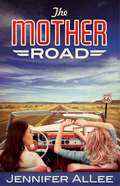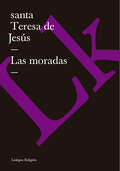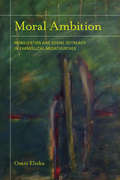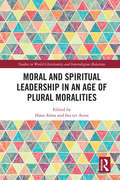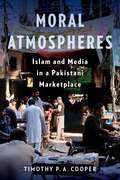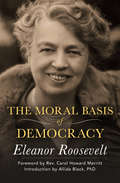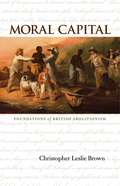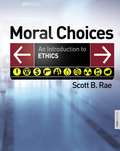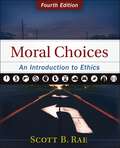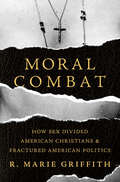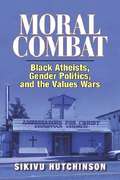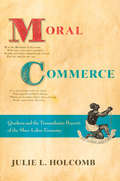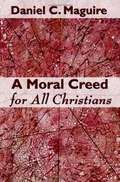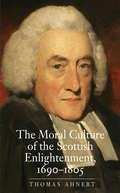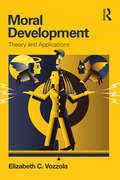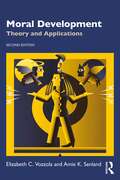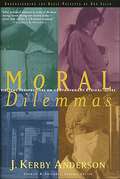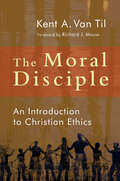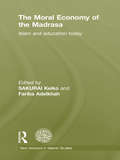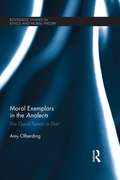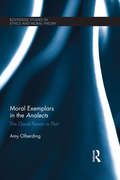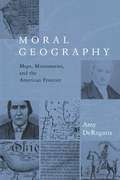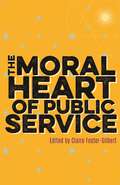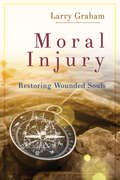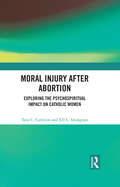- Table View
- List View
The Mor Road
by Jennifer AlleeWithin the course of a week, Natalie is dumped by her husband, receives an urgent call home from her father, and discovers her estranged sister is pregnant. A road trip on Route 66 may not help, but it sure couldn't hurt. Or so Natalie thinks, until Lindsay's boyfriend starts stalking them. Will their trip down the Mother Road bring the two sisters closer together or turn out to be the biggest wrong turn yet?
Las moradas
by Santa Teresa de JesúsLas moradas is the main text of Santa Teresa, describing a journey through the mysteries of the spirit in search of enlightenment.
Moral Ambition: Mobilization and Social Outreach in Evangelical Megachurches
by Omri ElishaIn this evocative ethnography, Omri Elisha examines the hopes, frustrations, and activist strategies of American evangelical Christians as they engage socially with local communities. Focusing on two Tennessee megachurches, Moral Ambition reaches beyond political controversies over issues such as abortion, same-sex marriage, and public prayer to highlight the ways that evangelicals at the grassroots of the Christian Right promote faith-based causes intended to improve the state of social welfare. The book shows how these ministries both help churchgoers embody religious virtues and create provocative new opportunities for evangelism on a public scale. Elisha challenges conventional views of U.S. evangelicalism as narrowly individualistic, elucidating instead the inherent contradictions that activists face in their efforts to reconcile religious conservatism with a renewed interest in compassion, poverty, racial justice, and urban revivalism.
Moral and Spiritual Leadership in an Age of Plural Moralities (Studies in World Christianity and Interreligious Relations)
by Ina Ter Avest Hans AlmaIn crisis situations, such as terror attacks or societal tensions caused by migration, people tend to look for explicit moral and spiritual leadership and are often inclined to vote for so-called 'strong leaders'. Is there a way to resist the temptation of the simplistic solutions that these ‘strong leader’ offer, and instead encourage constructive engagement with the complex demands of our times? This volume utilises relational and dialogical perspectives to examine and address many of the issues surrounding the moral and spiritual guidance articulated in globalizing Western societies. The essays in this collection focus on the concept of plural moralities, understood as divergent visions on what is a 'good life', both in an ethical, aesthetical, existential, and spiritual sense. They explore the political-cultural context and consequences of plural moralities as well as discussing challenges, possibilities, risks, and dangers from the perspective of two promising relational theories: social constructionism and dialogical self theory. The overarching argument is that it is possible to constructively put in nuanced moral and spiritual guidance into complex, plural societies. By choosing a clear theoretical focus on relational approaches to societal challenges, this interdisciplinary book provides both a broad scope and a coherent argument. It will be of great interest to scholars of social and political psychology, leadership and organization, religious studies, and pedagogy.
Moral Atmospheres: Islam and Media in a Pakistani Marketplace (Religion, Culture, and Public Life #51)
by Timothy P. CooperLahore’s Hall Road is the largest electronics market in Pakistan. Once the center of film and media piracy in South Asia, it now specializes in smartphones and accessories. For Hall Road’s traders, conflicts between the economic promises and the moral dangers of film loom large. To reconcile their secular trade with their responsibilities as devoted Muslims, they often look to adjudicate the good or bad moral “atmosphere” (mahaul) that can cling to film and media.Timothy P. A. Cooper examines the diverse and coexisting moral atmospheres that surround media in Pakistan, tracing public understandings of ethical life and showing how they influence economic behavior. Drawing on extensive ethnographic work among traders, consumers, collectors, archivists, cinephiles, and cinephobes, Moral Atmospheres explores varied views on what the relationship between film and faith should look, sound, and feel like for Pakistan’s Muslim-majority public. Cooper considers the preservation and censorship of film in and outside of the state bureaucracy, contestations surrounding heritage and urban infrastructure, and the production and circulation of sound and video recordings among the country’s religious minorities. He argues that a focus on atmosphere provides ways of seeing moral thresholds as mutable and affective, rather than as fixed ethical standpoints. At once a vivid ethnography of a market street and a generative theorization of atmosphere, this book offers fresh perspectives on moral experience and the relationship between religion and media.
The Moral Basis of Democracy
by Eleanor RooseveltA wartime manifesto on the moral obligations of democratic citizens from the most influential first lady in American history. With the threat of the Third Reich looming, Eleanor Roosevelt employs the history of human rights to establish the idea that at the core of democracy is a spiritual responsibility to other citizens. Roosevelt then calls on all Americans, especially the youth, to prioritize the well-being of others and have faith that their fellow citizens will protect them in return. She defines this trust between people as a trait of true democracy. Roosevelt advances an optimistic model for the democracy of the future, and although we&’ve taken some steps in the direction of her vision, it&’s still a long way from reality. The issues first addressed in this 1940 essay—namely financial inequality and racial discrimination—are sadly still relevant today, as bigotry continues to undermine our national unity. Her first publication as first lady, The Moral Basis of Democracy is an honest and heartfelt call for all Americans to choose love and faith over hatred and fear. Roosevelt takes an inspiring stance in defense of democracy, progress, and morality; the wisdom imparted here is timeless, and a must-read for every American. This edition features a foreword by Rev. Carol Howard Merritt, an introduction by Roosevelt historian Allida Black, PhD, and an illustrated biography of Eleanor Roosevelt including images from the author&’s estate.
Moral Capital
by Christopher Leslie BrownRevisiting the origins of the British antislavery movement of the late eighteenth century, Christopher Leslie Brown challenges prevailing scholarly arguments that locate the roots of abolitionism in economic determinism or bourgeois humanitarianism. Brown instead connects the shift from sentiment to action to changing views of empire and nation in Britain at the time, particularly the anxieties and dislocations spurred by the American Revolution. The debate over the political rights of the North American colonies pushed slavery to the fore, Brown argues, giving antislavery organizing the moral legitimacy in Britain it had never had before. The first emancipation schemes were dependent on efforts to strengthen the role of the imperial state in an era of weakening overseas authority. By looking at the initial public contest over slavery, Brown connects disparate strands of the British Atlantic world and brings into focus shifting developments in British identity, attitudes toward Africa, definitions of imperial mission, the rise of Anglican evangelicalism, and Quaker activism.Demonstrating how challenges to the slave system could serve as a mark of virtue rather than evidence of eccentricity, Brown shows that the abolitionist movement derived its power from a profound yearning for moral worth in the aftermath of defeat and American independence. Thus abolitionism proved to be a cause for the abolitionists themselves as much as for enslaved Africans.
Moral Choices: An Introduction to Ethics
by Scott RaeWith its unique union of theory and application and its well-organized, easy-to-use design, Moral Choices has earned its place as the standard text for college ethics courses. This third edition offers extensive updates, revisions, and brand new material, all designed to help students develop a sound and current basis for making ethical decisions in today's complex postmodern culture. Moral Choices outlines the distinctive elements of Christian ethics while avoiding undue dogmatism. The book also introduces other ethical systems and their key proponents, including Plato, Aristotle, Augustine, Aquinas, and Kant. After describing a seven-step procedure for tackling ethical dilemmas, author Scott Rae uses case studies to help students think critically and biblically about ? Abortion ? Reproductive Technologies ? Euthanasia ? Capital Punishment ? Sexual Ethics ? The Morality of War ? Genetic Technologies and Human Cloning ? NEW: Ethics and Economics New features include online resources for instructors; a chapter covering global capitalism, environmental ethics, and business ethics; new material on bioethics and on stem cell and embryo research; discussion questions at the end of each chapter; and sidebars with case studies.
Moral Choices: An Introduction to Ethics
by Scott RaeWith its unique union of theory and application and its well-organized, easy-to-use design, Moral Choices has earned its place as the standard text for college ethics courses. This fourth edition offers extensive updates, revisions, and three brand new chapters all designed to help students develop a sound and current basis for making ethical decisions in today's complex postmodern culture.Moral Choices outlines the distinctive elements of Christian ethics while avoiding undue dogmatism. The book also introduces other ethical systems and their key historical proponents, including Plato, Aristotle, Augustine, Thomas Aquinas, and Immanuel Kant.After describing a seven-step procedure for tackling ethical dilemmas, author Scott Rae uses case studies to address some of today's most pressing social issues. He guides students in thinking critically and biblically about issues, including:AbortionReproductive TechnologiesEuthanasiaCapital PunishmentSexual EthicsThe Morality of WarGenetic Technologies and Human CloningEthics and EconomicsNEW: Creation CareNEW: Animal RightsNEW: Gun-ControlNEW: Race, Gender, and DiversityNEW: Immigration, Refugees, and Border ControlFEATURESRelevant Case Studies throughoutDiscussion questions at the end of each chapterSidebars with case studies for discussionRecommended further reading
Moral Combat: How Sex Divided American Christians and Fractured American Politics
by R. Marie GriffithFrom an esteemed scholar of American religion and sexuality, a sweeping account of the century of religious conflict that produced our culture wars Gay marriage, transgender rights, birth control--sex is at the heart of many of the most divisive political issues of our age. The origins of these conflicts, historian R. Marie Griffith argues, lie in sharp disagreements that emerged among American Christians a century ago. From the 1920s onward, a once-solid Christian consensus regarding gender roles and sexual morality began to crumble, as liberal Protestants sparred with fundamentalists and Catholics over questions of obscenity, sex education, and abortion. Both those who advocated for greater openness in sexual matters and those who resisted new sexual norms turned to politics to pursue their moral visions for the nation. Moral Combat is a history of how the Christian consensus on sex unraveled, and how this unraveling has made our political battles over sex so ferocious and so intractable.
Moral Combat: Black Atheists, Gender Politics, and the Values Wars
by Sikivu HutchinsonThe word atheism elicits shock, dread, anger, and revulsion among most African Americans. They view atheism as “amoral,” heresy, and race betrayal. Historically, the Black Church was a leading force in the fight for racial justice. Today, many black religious leaders have aligned themselves with the Religious Right. While black communities suffer economically, the Black Church is socially conservative on women’s rights, abortion, same sex marriage, and church/state separation. These religious “values wars” have further solidified institutional sexism and homophobia in black communities. Yet, drawing on a rich tradition of African American free thought, a growing number of progressive African American non-believers are openly questioning black religious and social orthodoxies. Moral Combat provides a provocative analysis of the political and religious battle for America’s soul. It examines the hijacking of civil rights by Christian fascism; the humanist imperative of feminism and social justice; the connection between K-12 education and humanism; and the insidious backlash of Tea Party-style religious fundamentalism against progressive social welfare public policy. Moral Combat also reveals how atheists of color are challenging the whiteness of “New Atheism” and its singular emphasis on science at the expense of social and economic justice. In Moral Combat, Sikivu Hutchinson highlights the cultural influence of African American humanist and atheist social thought in America. She places this tradition within the broader context of public morality and offers a far-reaching vision for critically conscious humanism
Moral Commerce: Quakers and the Transatlantic Boycott of the Slave Labor Economy
by Julie L. HolcombHow can the simple choice of a men's suit be a moral statement and a political act? When the suit is made of free-labor wool rather than slave-grown cotton. In Moral Commerce, Julie L. Holcomb traces the genealogy of the boycott of slave labor from its seventeenth-century Quaker origins through its late nineteenth-century decline. In their failures and in their successes, in their resilience and their persistence, antislavery consumers help us understand the possibilities and the limitations of moral commerce.Quaker antislavery rhetoric began with protests against the slave trade before expanding to include boycotts of the use and products of slave labor. For more than one hundred years, British and American abolitionists highlighted consumers’ complicity in sustaining slavery. The boycott of slave labor was the first consumer movement to transcend the boundaries of nation, gender, and race in an effort by reformers to change the conditions of production. The movement attracted a broad cross-section of abolitionists: conservative and radical, Quaker and non-Quaker, male and female, white and black.The men and women who boycotted slave labor created diverse, biracial networks that worked to reorganize the transatlantic economy on an ethical basis. Even when they acted locally, supporters embraced a global vision, mobilizing the boycott as a powerful force that could transform the marketplace. For supporters of the boycott, the abolition of slavery was a step toward a broader goal of a just and humane economy. The boycott failed to overcome the power structures that kept slave labor in place; nonetheless, the movement’s historic successes and failures have important implications for modern consumers.
A Moral Creed for All Christians
by Daniel MaguireMaguire urges that Christianity's real relevance for the renewal of American public life lies not in the myopic morality of the Christian Right nor in any particular program of the Left but in the enduring relevance of Jesus and biblical Christianity. He explains Christianity's indispensable moral conviction about God's care, rapport with the earth, the nature of ownership, the bond between justice and peace, the nature of enmity, the illogic of militarism, and the creative potential of the human species. Includes questions for group discussion.
The Moral Culture of the Scottish Enlightenment
by Thomas AhnertIn the Enlightenment it was often argued that moral conduct, rather than adherence to theological doctrine, was the true measure of religious belief. Thomas Ahnert argues that this "enlightened" emphasis on conduct in religion relied less on arguments from reason alone than has been believed. In fact, Scottish Enlightenment champions advocated a practical program of "moral culture," in which revealed religion was of central importance. Ahnert traces this to theological controversies going back as far as the Reformation concerning the conditions of salvation. His findings present a new point of departure for all scholars interested in the intersection of religion and Enlightenment.
Moral Development: Theory and Applications
by Elizabeth C. VozzolaA CHOICE Outstanding Academic Title 2014! This class-tested text provides a comprehensive overview of the classical and current theories of moral development and applications of these theories in various counseling and educational settings. Lively and accessible, this text engages students through numerous examples and boxes that highlight applications of moral development concepts in today’s media and/or interviews from some of today’s leading theorists or practitioners. Dilemma of the Day boxes help readers apply theory to real world situations. Each chapter concludes with discussion questions and further resources. Summary tables of theory strengths and weaknesses (Part 1) and tables that connect applications to their theoretical roots are provided in Part 2. Other highlights include: Provides an excellent resource for courses addressing the CACREP program objectives for Human Growth and Development. Emphasis on application helps readers make the connection between theory and moral issues of our time. Examines changes across time and experience in how people understand right and wrong and individual differences in moral judgments, emotions, and actions. Demonstrates how theory is used by today‘s helping professionals (Part 1). Integrates issues of gender and ethnicity throughout to prepare readers for practicing in a global culture. Chapter on global perspectives (ch. 6) reviews theories on the cultural aspects of morality including examples from China, Islam, Latin America, and Africa. Reviews the latest research methods techniques used in the field. Integrates classic work with contemporary guidelines for assessment and treatment. Highlights research on the moral and empathic development of antisocial youth, psychopaths, and individuals diagnosed on the Autism Spectrum. Each chapter in Part 1 provides a comprehensive overview of the theory under review, its strengths and challenges, and examples of how the theory applies to helping professionals. The theories covered include those by Freud, Piaget, Kohlberg, Rest, Gilligan, Nodding, Bandura, Turiel, Nucci, Haidt, and Shweder. Part 1 concludes with a summary of the key points and the strengths and weaknesses of each of the theories reviewed. Part 2 highlights promising applications of moral development theory in education and counseling. These include coverage of character education programs based on sound developmental theory and examples of how drawing on a deep grounding in moral development theory can help future counselors better evaluate their clients’ cognitive, emotional and behavioral challenges. The text explores specific approaches to helping clients with a variety of dysfunctional or developmental behavior problems like conduct disorder and psychopathy. Ideal as a text for advanced undergraduate and/or graduate courses on moral development or moral psychology or as a supplement in courses on human and/or child and/or social and personality development taught in psychology, counseling, education, human development, family studies, social work, and religion, this book’s applied approach also appeals to mental health and school counselors.
Moral Development: Theory and Applications
by Elizabeth C. Vozzola Amie K. SenlandMoral Development offers a comprehensive overview of classic and current theories of moral development and applications of these theories in various counseling and educational settings. It examines changes across time and experience in how people understand right and wrong, and individual differences in moral judgements, emotions, and actions. Elizabeth C. Vozzola and Amie K. Senland review the latest research in the field and integrate classic work with contemporary perspectives on assessment and treatment. Part 1 provides an understanding of a range of theories, explaining their strengths and challenges, and offering examples of how these theories apply to helping professionals. It covers Freud, Piaget, Kohlberg, Rest, Gilligan, Nodding, Bandura, Turiel, Nucci, Narvaez, Haidt, and Shweder. Part 2 highlights promising applications of moral development theory in education and counseling. Fully updated with new chapters on faith development and moral and prosocial development in infancy and early childhood, the text explores specific approaches to helping clients with a variety of clinical or developmental challenges and provides an excellent resource for courses addressing the CACREP program objectives for Human Growth and Development. It also integrates issues of gender, ethnicity, and culture throughout to prepare readers for practicing in a global culture and presents a new perspective: the cultural developmental approach. Illustrated throughout with examples that highlight applications of moral development concepts in today’s media, it also includes interviews from some of today’s leading theorists and practitioners. Ideal as a text for advanced courses on moral development and moral psychology, as well as courses on human, child, social and personality development taught in psychology, counseling, education, human development, family studies, social work, and religion. Its applied approach also appeals to mental health and school counselors.
Moral Dilemmas (Swindoll Leadership Library)
by Kerby AndersonJ. Kerby Anderson presents a penetrating volume of solid, practical answers to some of the most perplexing issues facing our society today-issues such as abortion, euthanasia, cloning, capital punishment, genetic engineering, and the environment.
The Moral Disciple: An Introduction to Christian Ethics
by Kent A. Van TilThe ability to judge good from bad, right from wrong, is a uniquely human characteristic. However, given the complexity of life, it is often difficult to discern which choice to make, where our responsibilities lie, or what the consequences of an action (or of a nonaction) will be. In The Moral Disciple Kent Van Til surveys the skills and dispositions that we need to address moral issues responsibly. This basic introduction to Christian ethics — the systematic evaluation of morality — highlights the centrality of Christ and the Christian faith in moral formation, and it offers an ethical framework to guide Christians as they engage a host of moral dilemmas, including those surrounding wealth, sexuality, and the end of life. Using easy-to-read prose and defining terms carefully, Van Til provides an accessible introduction to this crucial and practical subject.
The Moral Economy of the Madrasa: Islam and Education Today (New Horizons in Islamic Studies)
by Fariba Adelkhah Sakurai KeikoThe revival of madrasas in the 1980s coincided with the rise of political Islam and soon became associated with the "clash of civilizations" between Islam and the West. This volume examines the rapid expansion of madrasas across Asia and the Middle East and analyses their role in society within their local, national and global context. Based on anthropological investigations in Afghanistan, Bangladesh, China, Iran, and Pakistan, the chapters take a new approach to the issue, examining the recent phenomenon of women in madrasas; Hui Muslims in China; relations between the Iran’s Shia seminary after the 1979-Islamic revolution and Shia in Pakistan and Afghanistan; and South Asian madrasas. Emphasis is placed on the increased presence of women in these institutions, and the reciprocal interactions between secular and religious schools in those countries. Taking into account social, political and demographic changes within the region, the authors show how madrasas have been successful in responding to the educational demand of the people and how they have been modernized their style to cope with a changing environment. A timely contribution to a subject with great international appeal, this book will be of great interest to students and scholars of international politics, political Islam, Middle East and Asian studies and anthropology.
Moral Exemplars in the Analects: The Good Person is That
by Amy OlberdingIn this study, Olberding proposes a new theoretical model for reading the Analects. Her thesis is that the moral sensibility of the text derives from an effort to conceptually capture and articulate the features seen that are identified and admired pre-theoretically and thus prior to any conceptual criteria for virtue.
Moral Exemplars in the Analects: The Good Person is That (Routledge Studies in Ethics and Moral Theory)
by Amy OlberdingIn this study, Olberding proposes a new theoretical model for reading the Analects. Her thesis is that the moral sensibility of the text derives from an effort to conceptually capture and articulate the features seen in exemplars, exemplars that are identified and admired pre-theoretically and thus prior to any conceptual criteria for virtue. Put simply, Olberding proposes an "origins myth" in which Confucius, already and prior to his philosophizing knows whom he judges to be virtuous. The work we see him and the Analects'authors pursuing is their effort to explain in an organized, generalized, and abstract way why pre-theoretically identified exemplars are virtuous. Moral reasoning here begins with people and with inchoate experiences of admiration for them. The conceptual work of the text reflects the attempt to analyze such people and parse such experiences in order to distill abstract qualities that account for virtue and can guide emulation.
Moral Geography: Maps, Missionaries, and the American Frontier (Religion and American Culture)
by Amy DeRogatisMoral Geography traces the development of a moral basis for American expansionism, as Protestant missionaries, using biblical language and metaphors, imaginatively conjoined the cultivation of souls with the cultivation of land and made space sacred. While the political implications of the mapping of American expansion have been much studied, this is the first major study of the close and complex relationship between mapping and missionizing on the American frontier. Moral Geography provides a fresh approach to understanding nineteenth-century Protestant home missions in Ohio's Western Reserve. Through the use of maps, letters, religious tracts, travel narratives, and geographical texts, Amy DeRogatis recovers the struggles of settlers, land surveyors, missionaries, and geographers as they sought to reconcile their hopes and expectations for a Promised Land with the realities of life on the early American frontier.
The Moral Heart of Public Service
by Andrew Tremlett Claire Foster-Gilbert John Hall Mary Mcaleese Peter Hennessy Rowan Williams Stephen Lamport The Dean Westminster Vernon White William HagueNow more than ever, public servants must consider and reassess how to keep moral courage in public life alive. With ethical expectations and needs changing and government policies under increasing moral scrutiny, Claire Foster-Gilbert of Westminster Abbey Institute gathers a series of essays and lectures by herself and others, exploring the meaning of 'moral code' in today's public service, and how it can be rekindled in practice. Timely and timeless, the book is founded on traditional values of honesty, moral rigour and neighbourliness, and discusses how to champion stability, peace, community and virtue in contemporary public life. The authors, including eminent figures such as the former President of Ireland Mary McAleese, historian Peter Hennessy, former First Secretary of State William Hague and former Archbishop of Canterbury Rowan Williams, explain how realistic compromises can be balanced with clear goal-setting for ideal results. Forward-thinking and authoritative, this book will be a precious resource to anyone seeking to boost the circulation of integrity throughout all aspects of public life.
Moral Injury: Restoring Wounded Souls
by Larry Kent GrahamIf we can share our burdens, we can bear them. If we can bear them, we can change the circumstances that brought them about. In a world where anything goes, people have a hard time deciding what is right and what is wrong. Pastors have a hard time helping people discern right and wrong because the church’s theological language of sin and redemption have so little currency and even less cultural relevancy. How can pastors help people deal with their feelings of guilt, shame, and responsibility when most many people don’t believe in sin and have a limited or “flexible” moral framework? People need help assessing moral alternatives, reconciling what they have done with what they think is right, recovering from burdens of guilt and shame, and imagining moral options to serve the common good. It is the call of pastors, chaplains, and other spiritual caregivers to help people move from moral injury to pardon and, eventually, to sustained recovery and resilience—in essence this book will help pastors reclaim their pastoral tasks of soul care and moral guidance without succumbing to the temptation of moralizing. Using vivid examples, the author will look at how various religious communities seek, promote, and achieve personal wholeness and realize the common good. This understanding will inform pastors, so that they can help their congregants and communities become vital agents in a sea of, often, conflicting moral voices. The book will provide resources for identifying core assets, and how to assess the various codes and moral claims interacting within the kaleidoscopic climate in which we live. Drawing upon neuroscience, narrative spirituality, and collaborative communal engagement, the author gives tools to aid pastors, chaplains, and spiritual caregivers ameliorate the distress caused by dissonance and resulting in moral injury. The book will also provide resources for helping people bear the burdens of moral responsibility and for navigating the sometimes unbearable consequences of particular moral actions. The author concludes with suggestions for helping people suffering from injury to their integrity from misdeeds they endure, either as a result of their own actions or from those actions of others, move toward sustained resilience and more mature moral imagination. "There is no better guide—or collaborative partner—for navigating the moral territory of post-traumatic living than Larry Graham. In Moral Injury: Restoring Wounds Souls, Graham sounds a clarion call for religious leaders to cultivate habits of mind and body to meet the complex situations of our day. Rather than offering a birds-eye-view of the moral terrain, Graham invites readers to feel the earth under their feet and attune themselves to the climate of their moral environments. With his careful definitional work and theological acumen, he revivifies theological ethics for progressive Christians. [And beyond this audience, Graham displays the importance of theology in contemporary discussions of moral injury.]" – Shelly Rambo, Associate Professor of Theology, Boston University School of Theology "Larry Graham has created an extraordinary workbook for moral resiliency and healing. He restores hope for the excruciating pains of a broken conscience. A treasure house of timely and practical applications sure to enrich pastoral conversations!" - Paul W. Dodd, Chaplain (Colonel), U.S. Army (Retired) "This book is a must-read if we care about recovery from moral injury, not just in the wake of immediate trauma, but also in historical legacies that haunt us. Larry Graham illuminates how questions of God can be addressed in that process with grace and compassion, and he shows, via the experiences of people from a variety of cultures and faiths, how moral injury can be healed." - Rev. Rita Nakashima Brock, Ph.D., Senior Vice-President for Moral Injury Programs at Volunteers of America. She is the former Research Professor of Religion and Culture and Director of the Soul Repair Center at Brite Divinity School, Texas Christian University, Fort Worth, TX
Moral Injury After Abortion: Exploring the Psychospiritual Impact on Catholic Women
by Tara C. Carleton Jill L. SnodgrassMoral Injury After Abortion delves deeply into the psychospiritual responses that some women experience when an abortive act conflicts with their moral beliefs and values. The book is grounded in a qualitative, phenomenological study that examined the lived experiences of thirty Christian women after abortion. The study participants’ voices are woven throughout the book in a way that offers the reader a narrative understanding of their experiences and a thick description of the psychospiritual impact of moral injury after abortion. The book provides mental health scholars and professionals with strategies for assessing for moral injury experiences among women post-abortion as well as a guide for addressing the spiritual and psychological impact of post-abortive moral injury.
